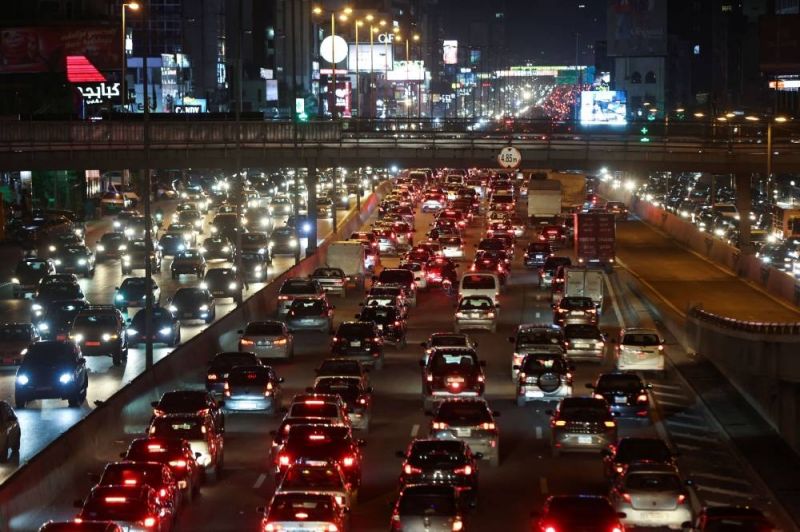
A view shows cars stuck in a traffic jam during holiday season in Jal al-Dib, Lebanon. This week, fuel prices dropped dramatically after the lira gained value on the parallel market. (Credit: Mohamed Azakir/Reuters)
Want to get the Morning Brief by email? Click here to sign up.
Queues of motorists formed at gas stations across Lebanon following a sharp drop in fuel prices concomitant to the lira’s recent recuperation from an all-time low on the parallel market. Eyewitnesses reported car lineups at gas stations in Saida, South Lebanon, and in Beirut’s suburbs of Hazmieh and Dekwaneh following the closure of refueling stops as 20 liters of 95-octane, 98-octane gasoline and diesel fell by LL137,000, LL141,000 and LL152,000, respectively. Following a long period of gasoline shortages, gas station closures and hourslong queues to refuel in summer 2021, Banque du Liban gradually removed fuel subsidies, completely dollarizing the substance and issuing regular price adjustments matching the fluctuations in the lira-to-dollar exchange rate. Gas station owners’ syndicate spokesperson Georges Brax claimed the new prices caused “losses of more than LL800,000 per can of gasoline” for stations, reportedly due to the inability to procure dollars to cover fuel imports at the BDL exchange platform Sayrafa rate at which the selling price was set. The Sayrafa rate on Wednesday stood around LL6,000 lower than the parallel market rate. The lira recently recovered from a record drop to LL47,000 against the US dollar, regaining value after BDL governor Riad Salameh raised the Sayrafa rate.
Gunmen opened fire on local television station Al Jadeed’s Beirut headquarters in another reportedly retaliatory attack after the airing of a controversial sketch. The station building, targeted the night before by a molotov cocktail, faced gunfire at around 1 a.m. on Wednesday morning. Independent Tripoli MP Ashraf Rifi condemned the attacks, lamenting security forces’ inability to protect the broadcaster while Lebanese Forces MP Ghayath Yazbeck called on authorities to “stop this crime and prevent it from spreading.” The attacks follow the airing of a skit implying sexual relations between United Nations Interim Forces in Lebanon peacekeepers and southern Lebanese women — a topical joke following the tragic death of Irish peacekeeper Sean Rooney and the injury of three of his fellow soldiers after a “premeditated” assault on their convoy, according to a judicial source speaking to AFP. Hezbollah on Monday reportedly brought into custody an alleged assailant while party MP Ibrahim Moussawi the same day condemned the sketch as an “odious act” against women in southern Lebanon.
United States Ambassador to Lebanon Dorothy Shea announced $1.3 million in aid from Washington to the United Nations’ children’s fund (UNICEF) to help fight cholera in the country. Since Lebanon recorded its first case of cholera in nearly 30 years in October, the disease has killed 23 people while the number of confirmed contaminations rose to 668, as of yesterday. The spread of cholera slowed in recent weeks amid Health Ministry interventions, largely funded through international grants including fuel for water treatment stations and donated vaccines distributed in an official campaign inoculating more than half a million people in its first phase. Despite caretaker Health Minister Firass Abiad expressing initial fears that cholera would become “endemic” to Lebanon, he recently announced the disease is “under control.” Abiad on Monday said the epidemic could have positive repercussions by highlighting deficiencies in Lebanon’s infrastructure and incentivizing international grants to mend utilities.
The Health Ministry ordered the withdrawal of a cancer drug smuggled into Lebanon containing “serious and fatal” contaminants, according to a warning from the World Health Organization. The batch of Methotrex 50mg arrived in Yemen and Lebanon “outside the regulatory supply chain,” the WHO said, noting that the shipment was intended to be sold exclusively in India. Pharmacists’ syndicate head Joe Salloum told local news outlet el-Nashra the contaminant Pseudomonas aeruginosa, a microorganism that sometimes causes deadly infections, “could be fatal for a healthy person,” let alone a child suffering from cancer. While the central bank maintains subsidies for medications treating patients afflicted with cancer and chronic diseases, the country’s economic crisis and the stark local currency devaluation have caused dangerous drug shortages and exacerbated access to medicines.
In case you missed it, here’s our must-read story from yesterday: “BDL tries to adjust the exchange market again”
Compiled by Abbas Mahfouz
